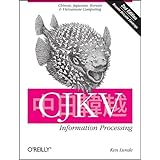
Average Reviews:

(More customer reviews)The previous edition of this book was so useful that I had two copies, one at work and one at home. I work in Chinese, Japanese, and Korean, and the previous edition, which only claimed to cover Japanese, was still the most useful book on Chinese and Korean info processing that I ever found. With this new edition, the author has extended coverage to all Asian languages that use Chinese characters, or used to do so in the case of Vietnamese, as part of their writing systems.
Thank goodness he has. The author, Ken Lunde, has an encyclopedic knowledge of this material. In addition, he is one of those people to whom anything less than strict, literal correctness is intolerable. Authors of this sort usually write in a style reminiscent of the federal tax code. Lunde manages to avoid this, creating one of those rare and delightful computer books that serve as a lucid tutorial the first time through, and as a strict and comprehensive reference thereafter.
The principal reason I consider this book the bible for Asian language information processing is the extreme difficulty of getting most of this information via any other source. In fact, I'd be hard pressed to think of another computer book whose original source material is as scattered, poorly documented, and often unreliable as that Lunde had to gather to produce this book. His job of ferreting out the details, cross-checking, error correction, and organization into a single book makes this almost a work of journalism. If you do CJKV work, you'll need more than just this book, of course, but the book is full of references to other material, so this is the place to start.
Lunde also provides a lot of usable source code in the book. This is not unusual in a computer book, but this code is special in two ways. First, it's available in C, Java, and Perl, not just in C. This is refreshing, given the increasingly prominent roles played by Java and Perl on the Internet--the place where multilingual computing arguably matters most.
Second, his code serves as a great checklist for what has to be done by any similar code. This is one of those difficult types of programming where many bugs aren't easy to see, because of the large number of obscure "gotchas" and arcane details. Lunde doesn't miss much, and he revels in these arcane details. His code is not highly optimized, and he admits as much, but if his code does something, you need to do it, and if it doesn't, you (probably) don't need to, either. This fact alone justifies the cost of the book for any developer to whom bugs might have financial consequences.
If you're going to do CJKV work, this is the bible. As I said, it's not the only thing you'll need, but it's where you should start.
Click Here to see more reviews about: CJKV Information Processing: Chinese, Japanese, Korean & Vietnamese Computing
First published a decade ago, CJKV Information Processing quickly became the unsurpassed source of information on processing text in Chinese, Japanese, Korean, and Vietnamese. It has now been thoroughly updated to provide web and application developers with the latest techniques and tools for disseminating information directly to audiences in East Asia. This second edition reflects the considerable impact that Unicode, XML, OpenType, and newer operating systems such as Windows XP, Vista, Mac OS X, and Linux have had on East Asian text processing in recent years. Written by its original author, Ken Lunde, a Senior Computer Scientist in CJKV Type Development at Adobe Systems, this book will help you:
Learn about CJKV writing systems and scripts, and their transliteration methods
Explore trends and developments in character sets and encodings, particularly Unicode
Examine the world of typography, specifically how CJKV text is laid out on a page
Learn information-processing techniques, such as code conversion algorithms and how to apply them using different programming languages
Process CJKV text using different platforms, text editors, and word processors
Become more informed about CJKV dictionaries, dictionary software, and machine translation software and services
Manage CJKV content and presentation when publishing in print or for the Web
Internationalizing and localizing applications is paramount in today's global market -- especially for audiences in East Asia, the fastest-growing segment of the computing world. CJKV Information Processing will help you understand how to develop web and other applications effectively in a field that many find difficult to master.

0 comments:
Post a Comment